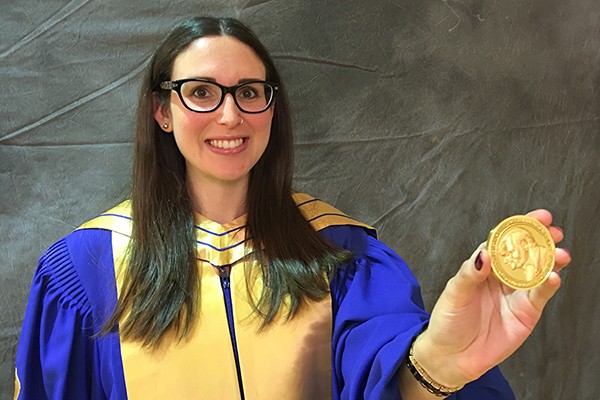 Biology grad Christine Madliger (PhD 2016) received the Governor General’s Gold Medal during Uwindsor’s 106th Convocation ceremonies Saturday.
Biology grad Christine Madliger (PhD 2016) received the Governor General’s Gold Medal during Uwindsor’s 106th Convocation ceremonies Saturday.
If she had to sum up her UWindsor experience in one word, it would be “opportunity,” says Christine Madliger, winner of the 2016 Governor General’s Gold Medal for the highest academic standing at the graduate level among her cohort.
She graduated in June with her doctorate in biological sciences and received her medal during Convocation ceremonies Saturday in the St. Denis Centre. Dr. Madliger credits her supervisor, professor Oliver Love, with providing opportunities for her to find success.
“I am really appreciative of my lab environment,” she says. “That’s the reason I was able to thrive here.”
During her graduate studies at UWindsor, she received scholarships from the University, professional organizations, and the Natural Sciences and Engineering Research Council of Canada — at the master’s and doctoral levels.
The author of 10 publications in peer-reviewed journals, she has presented at more than 26 international conferences, and published all five chapters of her PhD thesis, Assessing baseline glucocorticoids as conservation biomarkers in a declining aerial insectivore, in high-impact journals.
Dr. Love describes Madliger as far and away the strongest graduate researcher in his lab since he started at the University.
“She has played an enormous role in supporting my research team with both field and analytical expertise,” he wrote in nominating her for this honour. “My lab, the department and our University have been lucky to have her on our teams.”
In addition to her own thesis-based research, Madliger organized a symposium, “Physiology in changing landscapes: an integrative perspective for conservation biology,” at the 2015 International Society for Integrative and Comparative Biology conference, where she brought together the foremost international experts in conservation physiology.
She says it was an “amazing” opportunity to meet with experts in the emerging field.
“I like to think philosophically about things, and what I enjoy about working in a relatively new field is that you have the opportunity to put new ideas out there,” says Madliger. “How can we take physiological tools and find ways that they can actually benefit conservation?”
She is currently conducting post-doctoral research with Love and Carleton professor Steven Cooke.
